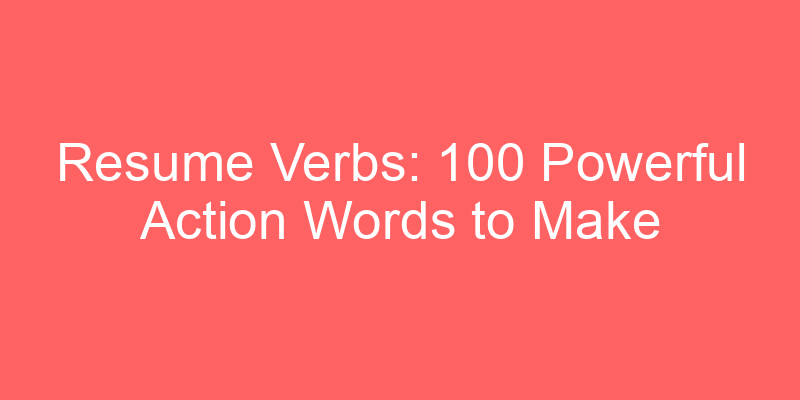100 Powerful Resume Verbs for Job Search Success
Understanding the Impact of Action Verbs on Your Resume
When crafting your resume, the choice of verbs can significantly impact how your experiences are perceived by employers. Action verbs not only convey a sense of dynamism but also highlight your achievements effectively. They help paint a vivid picture of your skills and accomplishments, making your resume stand out from the competition.
Why Are Resume Verbs Important?
Resume verbs play a crucial role in portraying your capabilities and achievements succinctly. They provide clarity and directness to your accomplishments, which is vital in catching the recruiter’s attention amidst the sea of applications they receive daily. Using powerful verbs can transform a bland job description into a compelling narrative of your career journey.
How to Use Powerful Verbs in Your Resume
Integrating strong verbs begins with identifying the key skills and achievements in each job you’ve held. For instance, instead of saying “responsible for managing a team,” opt for “orchestrated a high-performing team.” This change not only emphasizes your leadership skills but also showcases your ability to drive results effectively.
Examples of Effective Resume Verbs
Here are some examples of powerful verbs categorized by the skills they emphasize:
| Category | Examples of Verbs |
|---|---|
| Leadership | Directed, Led, Mentored |
| Communication | Conveyed, Presented, Negotiated |
| Problem-solving | Diagnosed, Resolved, Innovated |
| Achievement | Attained, Secured, Exceeded |
Implementing Resume Verbs in Your Application
Consider the following example where a candidate improves their resume by incorporating powerful verbs:
Original: “Responsible for handling customer queries.”
Improved: “Resolved customer queries promptly, achieving a 95% satisfaction rate.”
Conclusion
Choosing the right action verbs can elevate your resume from ordinary to outstanding. They not only emphasize your skills and achievements but also demonstrate your proactive attitude and capability to deliver results. Remember, every word on your resume counts—make each verb work in your favor to impress recruiters and land that dream job.
100 Powerful Resume Verbs
Effective Verbs to Elevate Your Resume
When crafting a resume, the choice of verbs can significantly impact how your experience and achievements are perceived. Using powerful verbs not only communicates your skills effectively but also captures the attention of recruiters. Whether you’re updating your resume or starting from scratch, integrating impactful verbs can make a substantial difference.
Choosing the Right Verbs
It’s crucial to select verbs that highlight your accomplishments and contributions. For instance, instead of saying “responsible for,” opt for stronger alternatives like “orchestrated,” “initiated,” or “implemented.” These verbs convey proactive engagement and leadership, essential qualities in any job application.
Benefits of Using Powerful Verbs
Employing strong verbs not only makes your resume more engaging but also helps in passing through applicant tracking systems (ATS) that many companies use. ATS scan resumes for specific keywords and strong verbs can improve your chances of getting noticed. For example, verbs like “streamlined” or “optimized” demonstrate your ability to improve processes, which is highly valued in today’s competitive job market.
Examples of Effective Verbs in Resumes
Consider the impact of using verbs such as:
- Managed: Oversaw a team of 15 sales representatives, exceeding monthly targets by 20%.
- Coordinated: Organized an international conference attended by 500+ industry professionals.
- Revitalized: Transformed a struggling project into a profitable venture within six months.
- Negotiated: Secured a cost-saving deal with a key supplier, reducing expenses by 15% annually.
Implementing Verbs in Your Resume
When updating your resume, ensure consistency in verb tense and relevance to the job you’re applying for. Tailor your verb choices to match the specific skills and achievements sought by the employer. This customization not only aligns your resume with the job description but also demonstrates your suitability for the role.
Conclusion
Choosing the right verbs is a crucial aspect of crafting a compelling resume that stands out to potential employers. By leveraging powerful verbs, you not only enhance the readability and impact of your resume but also increase your chances of landing your desired job. Remember, every word on your resume should serve a purpose—make it count!
`
Generate Your NEXT Resume with AI
Accelerate your resume crafting with the AI Resume Builder. Create personalized resume summaries in seconds.




